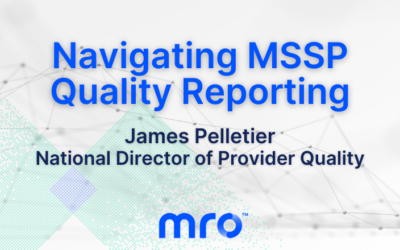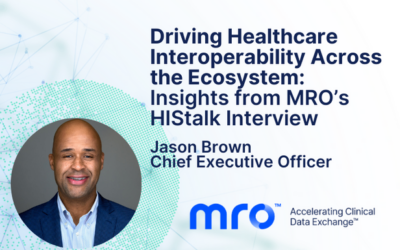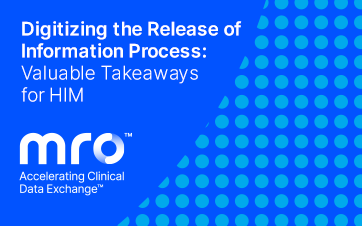MRO Viewpoints
Navigating MSSP Quality Reporting
EHR Connection vs. QRDA-1: How to Pick the Best Reporting Path In the realm of healthcare quality reporting, the method of data exchange plays a critical role in the accuracy, efficiency, and cost-effectiveness of the process. That’s why providers need to understand...
4 Critical Steps to Achieving Data Interoperability for Health Plans
In today’s healthcare ecosystem, data plays a pivotal role in influencing patient outcomes. For many health plans, navigating the complexities of interoperability and seamless data exchange remains a challenge. However, the ability to successfully navigate and...
Driving Healthcare Interoperability Across the Ecosystem: Insights from MRO’s HIStalk Interview
Data has always been at the forefront of healthcare, and the technology facilitating data exchange among healthcare stakeholders continues to evolve. With the surge in data demand, growing volumes of data, new exchange technologies, and the escalating risks of data...
Revolutionizing Clinical Data Exchange: Healthcare Innovation 2024 Innovator Award Winner
In healthcare today, efficiency and accuracy are paramount. Now, more than ever, healthcare organizations are seeking innovative solutions to streamline processes and enhance collaboration among stakeholders. At the heart of MRO’s mission lies a commitment to...
Transforming Healthcare: The Benefits of Digital Image Sharing
In the fast-paced world of healthcare, advancements in technology continue to revolutionize the industry, offering innovative solutions to enhance patient care. One such breakthrough is the sharing of digital images, a practice that has significantly transformed the...
Using Automation to Improve Payer Collaboration: On Air Insights
Managing laborious payer processes is one of the most cumbersome operational challenges for hospitals and health systems. From initial claim submission to filling additional documentation requests, and responding to payer audits or denials, healthcare provider...
ACOs prepare for eCQM quality reporting
A New Frontier: ACOs and the Shift to Electronic Clinical Quality Measures Healthcare quality reporting is evolving, and accountable care organizations (ACOs) are at the forefront of this change. In 2025, ACOs will be required to shift from traditional quality...
Digitizing the Release of Information Process: Valuable Takeaways for HIM
Evolving the ROI Process with a Focus on Digitization In August 2023, For the Record Magazine published a guest article co-authored by Anthony Murray, CISSP, and me. The article is entitled Release of Information: The Digitization of ROI, and includes valuable...
Following the Medical Record: On-Air with Mo Weitnauer
I recently sat down with MRO’s chief product officer, Mo Weitnauer, on our podcast show Follow the Medical Record. Mo and I discussed the world of clinical data exchange and its crucial role within the healthcare industry. We then chatted about the need for payers...








